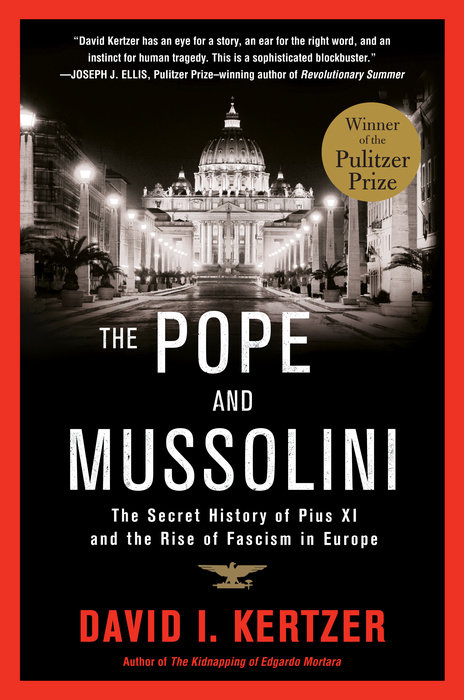
The Pope and Mussolini
The Secret History of Pius XI and the Rise of Fascism in Europe
کتاب های مرتبط
- اطلاعات
- نقد و بررسی
- دیدگاه کاربران
نقد و بررسی

Starred review from October 21, 2013
The 2002 public release of the archives of Pius XI’s papacy revealed a trove of historical treasures that Brown University professor Kertzer (The Kidnapping of Edgardo Mortara) found “irresistible.” He brings to life an intriguing and unlikely alliance of two powerful individuals, using extensive primary sources from both sides. Whether or not it was truly a partnership is suspect, but they undoubtedly needed each other’s cooperation. The reader is taken inside the papacy in incredible detail, exposing the Vatican’s inner workings, from the Pope’s schedule to what he kept on his desk, to the knife’s-edge particulars of dealing with Mussolini. The insidious way that Il Duce was able to create his dictatorship predates the rise of Hitler in Germany, though their stories possess remarkable parallels. Mussolini’s numerous love affairs offer interesting asides as the myriad intricacies of world-historical events like the Lateran Accords—which ended decades of antagonism between Italy and the Vatican, while establishing the latter’s sovereignty—play out. Kertzer unravels the relationship between two of 20th-century Europe’s most important political figures and does so in an accessible style that makes for a fast-paced must-read. 2 maps, 40 photos. Agent: Wendy Strothman, WJS LLC.

Starred review from December 1, 2013
More deeply troubling revelations around Vatican collaboration with evil. With the unsealing of archives in 2006 concerning the papacy of Pius XI, Kertzer (Social Science, Anthropology and Italian Studies/Brown Univ.; Amalia's Tale: A Poor Peasant, an Ambitious Attorney, and a Fight for Justice, 2008, etc.) found the call to scrutinize them "irresistible." The author spares no toes in his crushing of the church's "comforting narrative" around its relationship with Mussolini's fascist regime. The signing of the Lateran Accord in 1929 between the Holy See and the dictator established the Vatican as sovereign territory and bound the Catholic Church and the regime to a new period of codependence. Having been elected to the papacy just as Italy was rocked by cataclysmic violence between fascists thugs and socialists, Pius XI and his advisers "began to question the wisdom of opposing Mussolini's crusade." While Mussolini had previously spoken out against the power and holdings of the church, and the fascists unleashed a campaign of beatings of priests and Catholic activists, Mussolini's sudden and opportunistic embrace of the church by 1922--for example, asking for "God's help" in his first address to parliament--charmed Pius into thinking he had an ally to bring the church more firmly back into Italian life, which had been challenged by modernism. Although Mussolini's increasing cultivation of cult status alarmed Pius, his minions and, indeed, the church organ extolled fascism for seeking to "place spiritual values once again in the place of honor they once occupied, especially as required by the battle against liberalism." Even Mussolini's suppression of the pope's darling Catholic Action youth groups did not fray collaboration between them to marginalize Italian Protestants and Jews, until Pius grew ill and it was too late to change course. Kertzer is unflinching and relentless in his exposure of the Vatican's shocking actions.
COPYRIGHT(2013) Kirkus Reviews, ALL RIGHTS RESERVED.

December 15, 2013
Two leaders came to power in 1922 in Rome, Achille Ratti was elevated to the papacy as Pius XI, and Benito Mussolini was appointed Italian prime minister. How relations between them developed until the pope's 1939 demise occupies this original history, which rests on Kertzer's thorough research of available Vatican archives and other sources. His main line of inquiry, the degree of support Pius XI accorded to Mussolini, guides Kertzer's narrative, which begins with Mussolini's opportunistic about-face from anticlerical socialist to Catholic-tolerating nationalist. Papal approval during the 1920s, when Mussolini's regime survived political crises, received its reward in 1929 with the Lateran Accords that reestablished the Vatican as an independent state. Although he finds points of conflict between Pius XI and Mussolini, Kertzer underscores affinities between the Catholic Church and the fascist state, which may arouse controversy. Was the church as acquiescent to Mussolini's persecutions of Jews as Kertzer portrays? In any event, he adduces evidence that Pius XI seems to have regretted his tacit alliance with Mussolini. An important work of history, Kertzer's adroit profiles of Pius and Mussolini will broaden its audience.(Reprinted with permission of Booklist, copyright 2013, American Library Association.)

September 15, 2013
A National Book Award finalist for The Kidnapping of Edgardo Mortara--being adapted for film by Steven Spielberg and Tony Kushner and for Broadway by Alfred Uhry--Kertzer argues that contrary to popular opinion Pope Pius XI facilitated Mussolini's rule. Based on seven years' worth of research in the Vatican archives; bigger than the 25,000-copy first printing suggests.
Copyright 2013 Library Journal, LLC Used with permission.

























دیدگاه کاربران